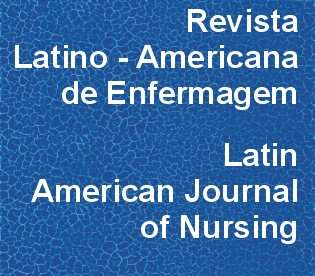Human error in daily intensive nursing care
DOI:
https://doi.org/10.1590/0104-1169.0479.2651Abstract
Objectives: to identify the errors in daily intensive nursing care and analyze them according to the theory of human error. Method: quantitative, descriptive and exploratory study, undertaken at the Intensive Care Center of a hospital in the Brazilian Sentinel Hospital Network. The participants were 36 professionals from the nursing team. The data were collected through semistructured interviews, observation and lexical analysis in the software ALCESTE(r). Results: human error in nursing care can be related to the approach of the system, through active faults and latent conditions. The active faults are represented by the errors in medication administration and not raising the bedside rails. The latent conditions can be related to the communication difficulties in the multiprofessional team, lack of standards and institutional routines and absence of material resources. Conclusion: the errors identified interfere in nursing care and the clients' recovery and can cause damage. Nevertheless, they are treated as common events inherent in daily practice. The need to acknowledge these events is emphasized, stimulating the safety culture at the institution.Downloads
Download data is not yet available.
Downloads
Published
2015-12-01
Issue
Section
Original Articles
License
RLAE’s authorship concept is based on the substantial contribution by each of the individuals listed as authors, mainly in terms of conceiving and planning the research project, collecting or analyzing and interpreting data, writing and critical review. Indication of authors’ names under the article title is limited to six. If more, authors are listed on the online submission form under Acknowledgements. The possibility of including more than six authors will only be examined on multicenter studies, considering the explanations presented by the authors.Including names of authors whose contribution does not fit into the above criteria cannot be justified. Those names can be included in the Acknowledgements section.
Authors are fully responsible for the concepts disseminated in their manuscripts, which do not necessarily reflect the editors’ and editorial board’s opinion.
How to Cite
Duarte, S. da C. M., Queiroz, A. B. A., Büscher, A., & Stipp, M. A. C. (2015). Human error in daily intensive nursing care . Revista Latino-Americana De Enfermagem, 23(6), 1074-1081. https://doi.org/10.1590/0104-1169.0479.2651



